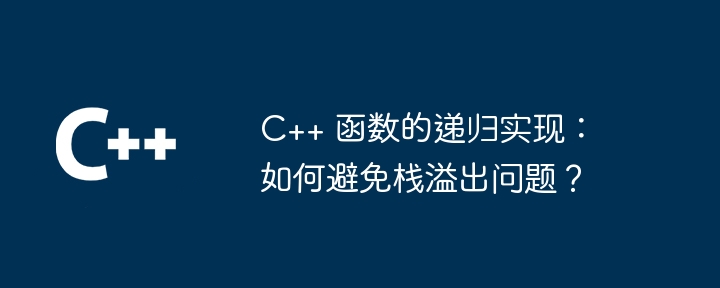
Stack overflow is a program crash that occurs due to insufficient stack memory due to too many recursive calls. One way to avoid stack overflow is to use tail recursion, which is to make the recursive call in the last operation of the function. In this way, the continuous accumulation of stack frames can be eliminated and stack overflows can be prevented. The sample code shows the use of tail recursion to implement factorial calculation, and the actual case shows examples of tail recursion in practical applications. However, it should be noted that tail recursion optimization only applies when the recursive call is the last operation of the function.

Recursive implementation of C function: avoiding stack overflow
What is stack overflow?
Stack overflow refers to the problem that when there are too many recursive function calls, the stack memory space is insufficient, causing the program to crash.
How to avoid stack overflow
One of the ways to avoid stack overflow is to use tail recursion instead.
What is tail recursion?
Tail recursion is a special recursive call method, which uses the recursive call as the last operation of the function. This eliminates the continuous accumulation of stack frames and thus avoids stack overflows.
Example
The following is C code to implement factorial calculation using tail recursion:
// 普通递归实现,会导致栈溢出 int factorial(int n) { if (n == 0) { return 1; } return n * factorial(n - 1); } // 尾递归实现,避免栈溢出 int factorial_tail(int n, int result) { if (n == 0) { return result; } return factorial_tail(n - 1, n * result); }
In the tail recursive version, the recursive call is at the end of the function an operation. It passes the current result as a parameter to subsequent calls, thus avoiding infinite accumulation of stack frames.
Practical case
The following is an example of practical application of tail recursion:
#includeint main() { int n; std::cout << "Enter a non-negative integer: "; std::cin >> n; // 使用尾递归计算阶乘 int factorial = factorial_tail(n, 1); std::cout << "Factorial of " << n << " is: " << factorial << std::endl; return 0; }
Note:tail-recursion optimization is not Applies to all recursive functions. This optimization can only be used when the recursive call is the last operation of the function.
The above is the detailed content of Recursive implementation of C++ functions: how to avoid stack overflow problems?. For more information, please follow other related articles on the PHP Chinese website!
 What are the differences between c++ and c language
What are the differences between c++ and c language Recommended learning order for c++ and python
Recommended learning order for c++ and python Cost-effectiveness analysis of learning python and c++
Cost-effectiveness analysis of learning python and c++ Is c language the same as c++?
Is c language the same as c++? Which is better to learn first, c language or c++?
Which is better to learn first, c language or c++? The difference and connection between c language and c++
The difference and connection between c language and c++ C++ software Chinese change tutorial
C++ software Chinese change tutorial Cost-effectiveness analysis of learning python, java and c++
Cost-effectiveness analysis of learning python, java and c++



